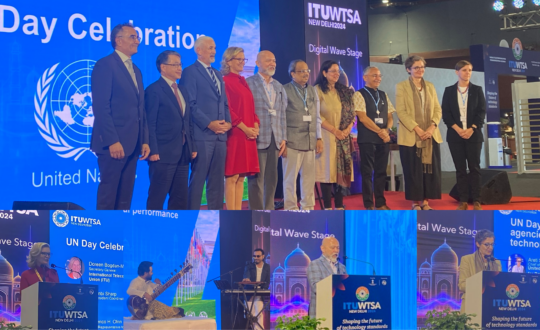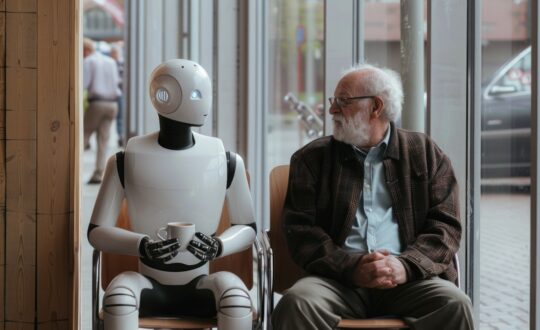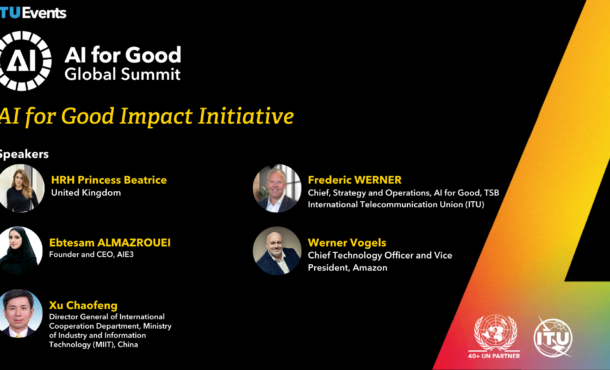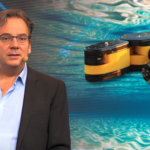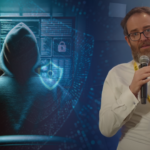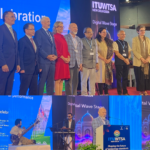Harnessing AI and Space Technologies for a Sustainable, Inclusive Future: Key Takeaways from Global Discussions at UNGA and Beyond
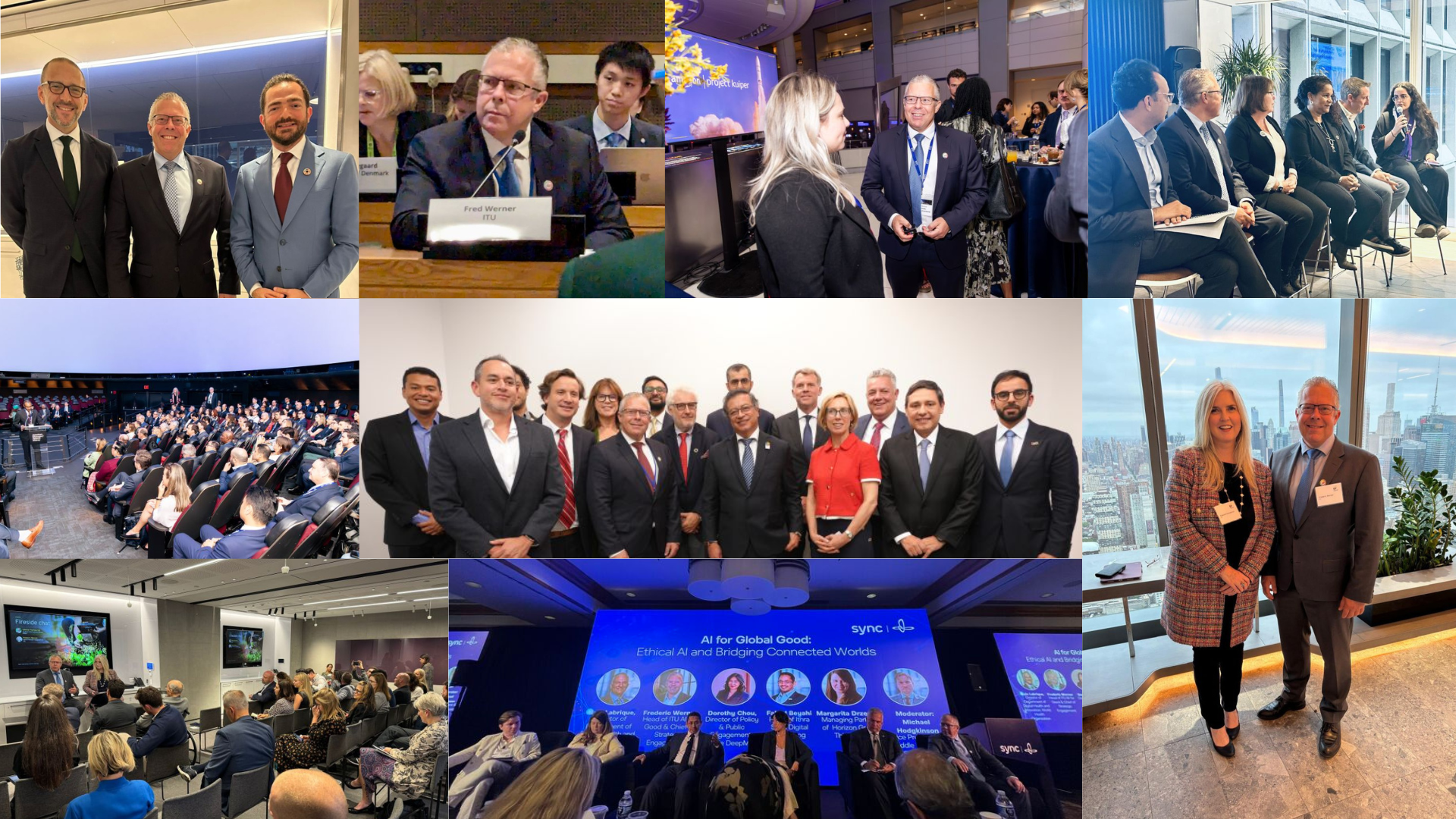
- 4 October 2024
By Frederic Werner
Over the past few weeks, I’ve (Frederic Werner, Chief, Strategy and Operations, AI for Good, ITU) had the incredible opportunity to participate in a series of high-level events, starting in San Francisco and culminating in New York during the United Nations General Assembly (UNGA) and the Summit of the Future. These discussions focused on the potential of AI, space technologies, and digital innovation to drive sustainable development, address global challenges, and ensure an inclusive future for all. Here’s a comprehensive look at the key takeaways from these events, which brought together global leaders, innovators, and stakeholders to explore how we can leverage technology for the greater good.
Kicking Off with AI Governance: Responsible Adoption of General AI in San Francisco
It all began in San Francisco, where I participated in the Responsible Adoption of General AI session organized by US-PECC and FPTPEC. This event, held as an official partner of the Paris AI Action Summit, explored the critical importance of creating governance frameworks that ensure AI is developed and deployed ethically and responsibly. The discussions provided valuable insights into how AI can be harnessed as a force for good in areas like governance, sustainability, and digital well-being.
UNGA’s SDG Digital Day: Leveraging Technology for Global Goals
From San Francisco, I headed to New York for SDG Digital, a pivotal event within the broader context of this year’s United Nations General Assembly and the Summit of the Future. SDG Digital Day focused on leveraging digital innovation to accelerate progress toward the Sustainable Development Goals (SDGs). It highlighted the power of AI to drive advancements in governance, sustainability, and digital well-being, aligning perfectly with the AI for Good initiative led by the International Telecommunication Union. We explored how AI can serve as a tool for achieving the SDGs, ensuring that these technologies are used to benefit humanity and foster sustainable development.
AI in Africa: Developing Fit-for-Purpose Governance Frameworks
One of the highlights of the week was my participation in a World Bank event on AI in Africa. Here, we discussed how African countries can create AI governance frameworks that align with national priorities and spur concrete action. The conversations delved into strategies for aligning AI initiatives with national development goals, involving diverse stakeholders, and contextualizing global principles for local contexts.
I am also pleased to announce that AI for Good Impact Africa will take place in 2025 along with AI Expo Africa, Nick Bradshaw!
During the event, I had the opportunity to share insights on ITU’s AI for Good initiatives, which are contributing to these efforts in significant ways:
- Innovation Factory: Supporting local innovators in developing AI solutions tailored to African challenges.
- ML Challenges: Encouraging collaborative problem-solving through machine learning competitions on pressing issues.
- AI Skills Coalition: Bridging the AI skills gap by enhancing AI literacy among policymakers and professionals.
- AI Safety Center Blueprint: Promoting responsible and ethical AI development across the continent.
- AI Hub with UNDP: Facilitating knowledge sharing and collaboration to create effective, locally relevant governance models.
We also explored opportunities for North-South collaboration, knowledge transfer, and capacity building, reinforcing the idea that by leveraging AI, we can foster equitable growth and sustainable development in Africa.
International AI Standards Summit and AI Skills Coalition: Shaping Global AI Governance
During the ImPACT Coalition on AI & Cyber-Tech Governance session in New York, I had the privilege of announcing several groundbreaking initiatives. First, we launched the International AI Standards Summit, which will take place at WTSA24 in New Delhi (October 14-18, 2024) and again at the AI for Good Global Summit in Geneva (July 8-11, 2025). This summit will bring together experts from around the world to develop global standards for safe, ethical, and inclusive AI that aligns with the SDGs.
In addition, I proudly announced the launch of the International Telecommunication Union AI Skills Coalition, spearheaded by AI for Good under the AI for Good Impact Initiative. This coalition is set to become the world’s most trusted and up-to-date platform for delivering AI skills, knowledge, and expertise, aiming to democratize AI learning by providing accessible, high-quality training resources for all. Its mission is to bridge the global AI skills gap by empowering talent from around the world, particularly focusing on women, youth, and marginalized groups in developing regions. Our aim is to building a trusted platform for AI skills and knowledge that will equip the next generation of innovators and leaders.
At AI for Good, we are committed to bridging the global AI skills gap, empowering global talent, fostering inclusivity, especially focusing on women, youth, and marginalized groups, and creating global partnerships across industries, governments, and academia.
Read more on the AI Skills Coalition
Empowering Youth: Advancing Connectivity and Learning for Sustainable Development
In New York, I had the honour to join SAP & World Organization of the Scout Movement (WOSM) in co-hosting the third edition of the Learning and Skills for Sustainable Youth Development Dialogue Series during the United Nations General Assembly Week. This series has evolved into a vibrant movement, uniting multisectoral organizations to share best practices and foster innovative collaborations for youth empowerment and development.
During our discussions, we emphasized the critical need for enhancing connectivity to enable learning environments and connect schools and youth worldwide. At ITU, initiatives like Partner to Connect and Giga are leading efforts to address these challenges, ensuring that digital learning tools reach those who need them most.
A Night at the Museum: Space Technologies for Sustainable Development
Another exciting event during UNGA was the “Night at the Museum: Space for Sustainable Development” event at the American Museum of Natural History. This gathering offered a unique opportunity to engage with global leaders on the role of space technologies in advancing the SDGs. The evening featured an immersive experience in the Hayden Planetarium Dome, showcasing the future of space exploration and Earth observation through stunning projections of planetary data and climate insights.
Key discussions with H.E. Hu’akavameiliku, Prime Minister of Tonga, and H.E. Ebba Busch, Vice Prime Minister of Sweden, emphasized how space technologies can drive innovation, connectivity, and sustainable development. Highlights included Amazon’s Project Kuiper, which aims to bridge the digital divide by expanding global broadband connectivity, showcasing the potential of the growing $1 trillion space economy.
At #AIforGood, we have been making significant progress through initiatives like the GeoAI Discovery Series (30+ sessions since launch) and Machine Learning Challenges (100+ sessions since launch), which focus on using Earth observation images to tackle pressing SDGs such as climate action and food security. By harnessing the power of AI, we’re unlocking new ways to understand our planet and accelerate progress toward these goals.
Discover the Neural Network AI for Good programme
Read on Crowdsourcing AI and Machine Learning solutions for SDGs – ITU AI/ML Challenges 2024 Report
AI and Cybersecurity Roundtable: Securing the Future of AI
On September 25th, I had the honor of participating in Google and Access Now’s AI and Cybersecurity Roundtable. This event brought together an incredible array of professionals and thought leaders to address some of the most pressing challenges within the AI and cybersecurity landscape.
A key takeaway from the event was the urgent need to protect high-risk users by employing advanced AI security measures. During the Coalition for Secure AI overview, we discussed how industry leaders like Google are developing tools to ensure that AI systems are not only powerful but also secure and trustworthy. The moderated discussion that followed highlighted the challenges of navigating AI-specific risks in real-time, particularly with the growing threat of deepfakes and AI-generated content that is increasingly indistinguishable from human-generated material.
To address these issues, the International AI Standardization Summit will explore solutions for ensuring the authenticity and transparency of AI-generated content. This summit, organized by ITU, IEC, and ISO, will have its first edition in New Delhi in October 2024 and the second in Geneva in July 2025.
Building Strategic AI Alliances: Empowering Women and Youth
At the Building Strategic AI Alliances for Global Impact event, I had the pleasure of discussing the AI Skills Accelerator for Girls, a collaboration between the ITU Development Bureau and EY. This program is designed to equip young women globally with critical AI skills, preparing them to be future leaders in technology. The initiative combines online learning, practical workshops, and mentorship from experts, ensuring access to AI education even in underserved communities.
Thanks to EY’s Ripples CSR program, this initiative is gaining traction and highlights the importance of innovative partnerships in promoting inclusive and sustainable development.
Sync Digital Wellbeing Event: AI for Health and Wellbeing
Finally, I had the pleasure of speaking at the Sync Digital Wellbeing event, organized by our AI for Good Global Summit 2024 Diamond Sponsor Ithra. This profound gathering focused on harnessing the benefits of emerging technologies like AI for better health and wellbeing, while addressing the risks associated with these technologies.
During the session, we discussed the rapid evolution of AI, highlighting advances made by Google DeepMind and emphasizing the need for a proactive approach to AI governance, rather than the outdated “build it and fix it later” mindset.
A Collaborative Path Toward a Sustainable, AI-Driven Future
The past few weeks have been filled with inspiring dialogues and collaborations on how AI and space technologies can shape a more sustainable, connected future. Whether discussing AI governance frameworks in Africa, cybersecurity standards, or empowering women and youth, the key takeaway is clear: global cooperation is essential to ensure that AI serves as a force for good, driving sustainable development and inclusivity.
I look forward to continuing these vital conversations at the upcoming AI for Good Global Summit 2025 and other international forums, as we work together to harness AI’s potential to create a better future for all.



